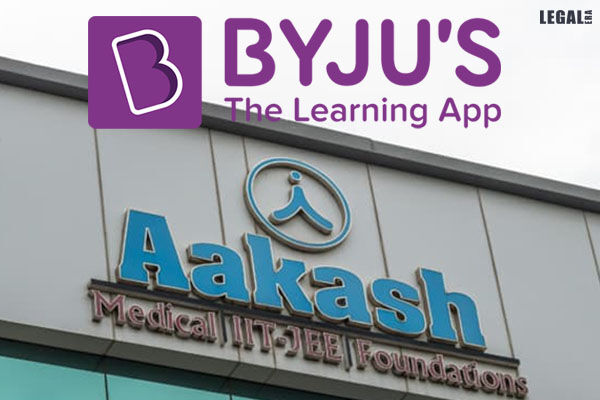
Supreme Court Declines to Halt Aakash’s Rights Issue Amid Byju’s CIRP
Introduction
The Supreme Court of India, on November 3, 2025, refused to interfere with an order of the National Company Law Appellate Tribunal (NCLAT) that had allowed Aakash Educational Services Ltd. (AESL), a subsidiary of Byju’s (Think and Learn Pvt. Ltd.), to proceed with its proposed rights issue. A Bench of Justice P.S. Narasimha and Justice Atul Chandurkar dismissed appeals filed by GLAS Trust Company LLC, representing Byju’s US creditors, and Shailendra Ajmera, the Insolvency Resolution Professional (IRP) of Byju’s. The Court observed that the NCLAT’s order was confined to the disposal of an interlocutory application and therefore did not warrant interference.
Factual Background
The appeals stemmed from the ongoing Corporate Insolvency Resolution Process (CIRP) of Think and Learn Pvt. Ltd. (Byju’s), which was admitted to insolvency by the National Company Law Tribunal (NCLT), Bengaluru, on July 16, 2024. During the CIRP, GLAS Trust Company LLC, holding 99.41% of voting share in the Committee of Creditors (CoC), challenged certain resolutions passed by Aakash Educational Services Ltd. (AESL) in its Extraordinary General Meeting (EGM) dated November 20, 2024. The resolutions amended Aakash’s Articles of Association (AoA), removing clauses that granted Byju’s substantial control over Aakash’s management and decision-making. These amendments were carried out in compliance with a Debenture Trust Deed (DTD) dated April 25, 2023, mandating such revisions to safeguard debenture holders’ interests.
Procedural Background
GLAS Trust initially filed an interlocutory application before the NCLT seeking to declare the EGM resolutions invalid. The NCLT declined to entertain the plea, prompting GLAS Trust to move the NCLAT in Company Appeal (AT) (CH) (Ins) No. 139 of 2025. In that appeal, GLAS Trust sought interim relief through IA No. 1514 of 2025, requesting an injunction to restrain Aakash from convening another EGM scheduled on October 29, 2025, which aimed to approve a rights issue and increase its authorised share capital. On October 28, 2025, the NCLAT’s Chennai Bench dismissed the interlocutory application, leading to the present appeal before the Supreme Court.
Issues
- Whether Aakash Educational Services Ltd. could proceed with its rights issue during the CIRP of its parent company, Think and Learn Pvt. Ltd. (Byju’s).
- Whether the NCLAT erred in rejecting the interim injunction sought by GLAS Trust against the rights issue.
- Whether the NCLAT’s order adversely affected the interests of Byju’s creditors during insolvency proceedings.
Contentions of the Parties
Appellant (GLAS Trust & IRP of Byju’s): Argued that Aakash’s actions, including the rights issue and amendment of its AoA, diluted Byju’s 25.41% stake and contravened the NCLT’s status quo order dated March 27, 2025. Contended that these corporate steps were strategically designed to erode Byju’s control over Aakash and diminish the value of its assets. Sought judicial intervention to restrain Aakash from proceeding with the rights issue until the resolution of pending appeals.
Respondent (Aakash Educational Services Ltd.): Submitted that the amendments and rights issue were mandated under the Debenture Trust Deed of April 25, 2023, executed before Byju’s insolvency. Argued that the rights issue was a legitimate business measure to ensure Aakash’s financial stability, not an attempt to harm Byju’s or its creditors. Emphasized that Byju’s, as a shareholder, retained the right to participate in the rights issue and prevent dilution of its stake. Maintained that the Insolvency and Bankruptcy Code (IBC) does not empower a Resolution Professional to interfere with the internal affairs of a solvent subsidiary.
Reasoning and Analysis
The Supreme Court noted that the NCLAT’s order was limited to the interim stage and did not determine the final rights of the parties. The Bench agreed with the NCLAT’s finding that Aakash’s capital restructuring and rights issue were consequent to the Debenture Trust Deed and formed part of its independent business decisions. The NCLAT had rightly observed that restraining Aakash from such actions could commercially cripple a solvent subsidiary, thereby reducing the value of Byju’s shareholding. The Court also concurred that Byju’s and its creditors retained the right to subscribe to their entitlement in the rights issue, mitigating any potential dilution. Reiterating that appellate interference in interim orders should be minimal, the Court held that the NCLAT’s observations were confined to the disposal of the interlocutory application and would not prejudice the outcome of the main appeal pending before the NCLAT.
Implications
The decision underscores the Supreme Court’s deference to commercial autonomy and its reluctance to interfere in interim orders of specialized tribunals unless manifest illegality is shown. It clarifies that the moratorium under the IBC does not extend to the internal management of solvent subsidiaries of a corporate debtor. The decision also reinforces the principle that insolvency proceedings of a parent company cannot automatically stall the independent corporate actions of its subsidiaries.